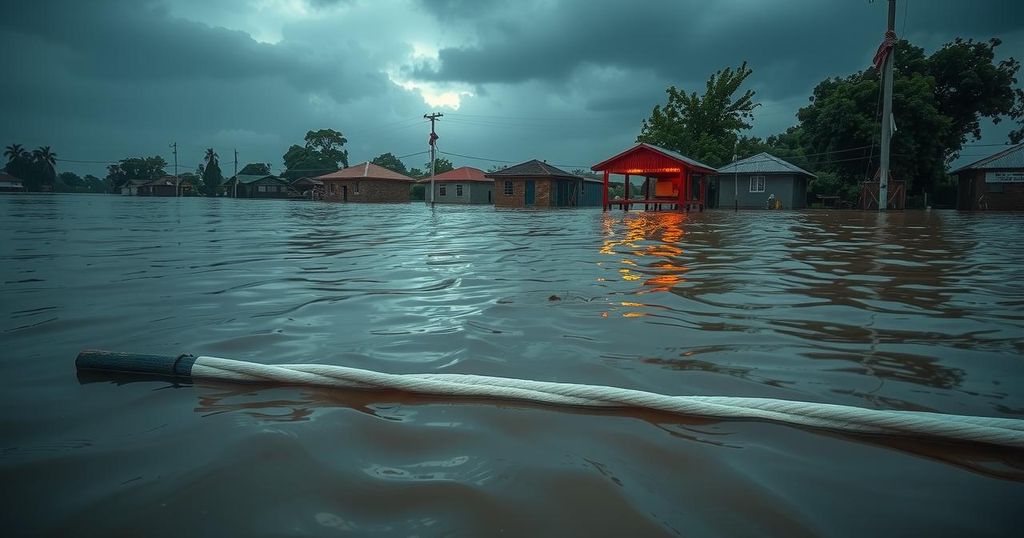Severe Flooding in South Sudan Worsens Health Crisis, WHO Reports
South Sudan is facing severe flooding, impacting over 226,000 people and exacerbating an ongoing humanitarian crisis. With health facilities submerged and rising cases of cholera and malaria reported, WHO is responding with emergency health kits and coordinating with local health authorities. Climate change is intensifying these floods, leading to critical challenges for the region’s vulnerable communities.
Severe flooding in South Sudan is causing significant humanitarian crises, impacting over 226,000 individuals and displacing thousands. According to the United Nations, the floods have engulfed vast areas, affecting 42 of the 78 counties within the nation. The flooding has submerged 58 health facilities across five counties and rendered 90 others inaccessible, with critical roadways leading to the capital, Juba, also cut off. The overall impact of the disaster has reportedly affected approximately 890,000 residents in flood-stricken regions as of October 4, 2024. Traditionally, South Sudan experiences heavy rainfall from April to November, which has historically resulted in floods. However, intensified flooding this year has been associated with climate change, contributing to the permanent displacement of communities. The World Health Organization (WHO) has indicated that this deluge has aggravated an already precarious humanitarian state, where an additional 800,000 refugees and returnees from the ongoing conflict in neighboring Sudan are present. In addition to the flooding, two suspected cholera cases have emerged in Renk County within the Upper Nile State, a critical entry point for refugees. Furthermore, malaria cases have surged, with over 120,000 reported cases and 31 suspect deaths as of late September 2024. Dr. Humphrey Karamagi, the WHO Representative in South Sudan, emphasized the heightened vulnerability of the population, stating, “People are in a heightened state of vulnerability due to multiple shocks. WHO is committed to work with the Ministry of Health and our partners to ensure that they have access to essential health services continue while also prioritizing the response to growing humanitarian and health needs.” In response to these challenges, WHO has distributed approximately 88 metric tonnes of emergency health kits to various locations, supporting over 870,000 people with essential medical supplies. Since January 2024, the agency has provided nearly 1,300 malaria kits nationwide and has prepositioned cholera investigative and diagnostic tools. To address this multifaceted health emergency, WHO is collaborating with the South Sudanese Ministry of Health to enhance the response efforts, including conducting rapid assessments in affected areas. Additionally, the organization is monitoring health impacts with a keen focus on vector-borne and water-borne diseases while coordinating emergency health assistance throughout affected regions. WHO advocates for sustainable initiatives to bolster resilient health systems, which remain essential in mitigating the impacts of climate change on health.
The humanitarian landscape in South Sudan is dire, exacerbated by a combination of natural disasters and ongoing conflict. The recent floods represent one of the worst climatic events the country has faced in decades, resulting in significant infrastructural damage and complications for health services. During the rainy season, residents often grapple with flooding; however, the intensity and frequency of these floods have increased, prompting serious concerns related to climate change. Refugees fleeing conflict in Sudan have further compounded the dire situation, creating immense pressure on already strained health systems. Understanding the interplay of these factors is crucial for implementing effective responses to the current public health crisis.
In conclusion, the severe flooding in South Sudan has created a multifaceted health and humanitarian crisis, displacing hundreds of thousands of people and significantly impacting health facilities and essential services. The combination of environmental challenges and refugee influx underscores the urgent need for coordinated health responses and sustainable investment to develop resilient infrastructural systems. WHO’s commitment to addressing these challenges is essential for stabilizing health services and providing immediate aid to those in need during this critical time.
Original Source: sudantribune.com




Post Comment